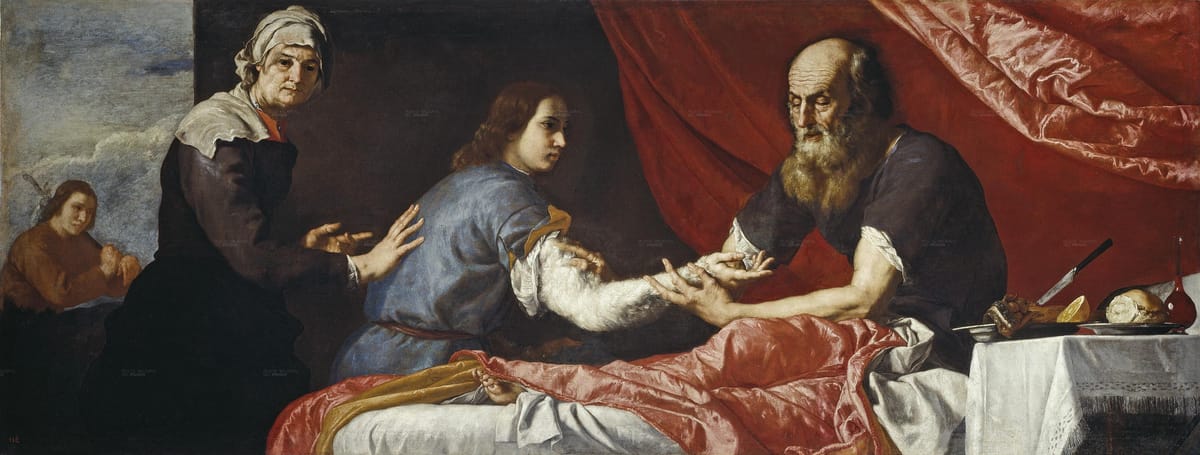Toyldoys / תולדת

This is a weekly series of frum, trans, anarchist parsha dvarim [commentaries]. It's crucial in these times that we resist the narrative that Zionism owns (or worse: is) Judaism. Our texts are rich—sometimes opaque, but absolutely teeming with wisdom and fierce debate. It's the work of each generation to extricate meaning from our cultural and religious inheritance. I aim to offer comment which is true to the source material (i.e. doesn't invert or invent meaning to make it more comfortable for us) and uses Torah like a light to reflect on our modern times.
Content note: mentions of Thanksgiving and stolen land, the occupation and genocide in Palestine, food insecurity, and gay stuff like bear-twink dynamics and piss play.
Bereshis 25:34
Appropriate for the week of Thanksgiving, this is a parsha about birthrights stolen. What are we entitled to by accident of birth?
Yakov is the cleverer child, and a patriarch of the Jewish people. He also tricks his brother and deceives his dying father for his own gain.
Yitskhok is blind. He tells Eysov, his favored son and firstborn, to go hunting and make him a meal so that be might bless him. Rivka hears this and instructs Yakov, her favorite, to trick Yitskhok so that he might receive his twin brother Eysov's blessing.
אוּלַי יְמֻשֵּׁנִי אָבִי וְהָיִיתִי בְעֵינָיו כִּמְתַעְתֵּעַ וְהֵבֵאתִי עָלַי קְלָלָה וְלֹא בְרָכָה׃
my father perhaps will feel me, and I shall seem to him a deceiver; and I shall bring a curse upon me, and not a blessing."
Bereshis 27:11–12
Eysov is a bear, Yakov is a twink. (The Rabbis read hairiness as wickedness and smoothness as goodness [Bereshis Rabo, 65:15], which is interesting if disappointing.) Eysov is brutish and not very bright, a hunter; Yakov is the second born, the weaker one, more feminine and frum (he "dwelt in tents"). Yakov is smarter. Both have a streak of cruelty.
While Eysov is out hunting, Rivka (not Yakov) does the hard work of killing, skinning, and prepping the goat meal before giving Yakov his brother's nicest clothes, plus goat gloves and a goat neck gaiter, in order to trick Yitskhok. Rivka is unhappy.
וַיֹּאמֶר יִצְחָק אֶל־בְּנוֹ מַה־זֶּה מִהַרְתָּ לִמְצֹא בְּנִי וַיֹּאמֶר כִּי הִקְרָה יְהֹוָה אֱלֹהֶיךָ לְפָנָי׃
וַיֹּאמֶר יִצְחָק אֶל־יַעֲקֹב גְּשָׁה־נָּא וַאֲמֻשְׁךָ בְּנִי הַאַתָּה זֶה בְּנִי עֵשָׂו אִם־לֹא׃
וַיִּגַּשׁ יַעֲקֹב אֶל־יִצְחָק אָבִיו וַיְמֻשֵּׁהוּ וַיֹּאמֶר הַקֹּל קוֹל יַעֲקֹב וְהַיָּדַיִם יְדֵי עֵשָׂו׃
וְלֹא הִכִּירוֹ כִּי־הָיוּ יָדָיו כִּידֵי עֵשָׂו אָחִיו שְׂעִרֹת וַיְבָרְכֵהוּ׃
וַיֹּאמֶר אַתָּה זֶה בְּנִי עֵשָׂו וַיֹּאמֶר אָנִי׃
And Yitskhok said to his son, How is it that you found it so quickly, my son? And he said, Because, Hashem your God sent me good speed.
And Yitskhok said to Yakov, Please, come near that I may feel you, my son, whether you are really my son Eysov or not.
And Yakov went near to Yitskhok his father; and he felt him, and said, The voice is Yakov's voice, but the hands are the hands of Eysov.
And he didn't recognise him, because his hands were hairy, as his brother Eysov’s hands: so he blessed him.
And he said, Are you really my son Eysov? And he said, I am.
Bereshis 27:19–24
Revisiting one of the questions from Vayeyro, the parsha two weeks ago, does Yitskhok know what's really happening? He expresses doubt four times, but bestows Eysov's blessing on Yakov anyway.
רש“י, בראשית כז:כא
רש“י, בראשית כז:כב
Rashi, Bereshis 27:21
Rashi, Bereshis 27:22
Rashi gives further reason for Yitskhok to doubt: Yakov speaks differently (gentler, more frumly) than Eysov. When Yiskhok learns the truth, he doesn't revoke the blessing he gave to Yakov, and instead of gives Eysov a different, lesser blessing.
Midrash goes to great lengths to excuse the deceit and mistreatment of Eysov and the elder Yitskhok. Because it is beshert—destiny—anything is justified retroactively.
בראשית רבה סה:יט
Bereshis Rabo 65:19
In the moment where he might be caught in the lie, Yakov pisses himself. His heart is softened—by fear? by guilt?—and angels come to hold him up on his shaky, wet knees. Not only his mother, but Hashem is aiding him in the deceit, and demands: do not become soft.
Birthrights, in ancient and modern Jewish practice, are inherently unethical. It is not a radical statement to suggest that all children are entitled to an equitable inheritance. What do we inherit as Jews? Torah; midrash; ritual; language; yom-toyvim; food; dance; and according to some, a piece of land. This birthright is used as justification for violence—for ethnic cleaning and all the other horrible things happening in the war.
What is a just inheritance? I am glad that, as Jews, we inherit our unique culture. I'm glad that it's a closed practice. I believe that Jews have a strong connection to the land in erets Yisroel [the land of Israel; in contrast with medinas Yisroel, the state]. I also see the value in Jews living together, in building community and infrastructure where can thrive together. I moved to Crown Heights, Brooklyn because I wanted to be around more Jews. While Crown Heights and erets Yisroel are historically Jewish areas, they do not belong exclusively to us. Other people also have a connection to these lands; it is not fair to claim them exclusively for ourselves. I'm an anarchist. I believe that no one has an exclusive land claim. All of humanity inherits the Earth.
Being dedicated to liberation requires not hardness but softness. It is an act of bravery to remain soft in hard times. Do not harden your heart to the injustices around you. May we enter Shabos with hearts of wax.